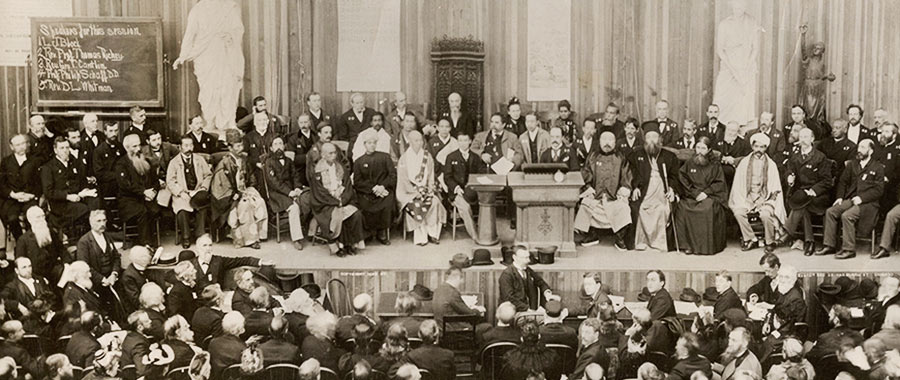The Parliament of the World’s Religions represents an extraordinary confluence of beliefs, a sanctum wherein the myriad faiths of humanity converge to foster dialogue, understanding, and collaboration. This assemblage, which first convened in 1893 in Chicago, marked a pivotal moment in the annals of interreligious dialogue, showcasing a collective yearning for unity amidst diversity. Exploring the teachings of the Bahá’í Faith within this context offers profound insights into the promise of spiritual progression and the elevation of human interactions.
A Historical Backdrop
The inaugural Parliament of the World’s Religions was not merely a gathering; it was a clarion call for ethical engagement among diverging faith traditions. Situated at the pinnacle of the 1893 World’s Fair, it attracted dignitaries, theologians, and spiritual leaders from across the globe. This monumental event was attended by the Bahá’í representative, a testament to the Bahá’í commitment to global harmony and understanding.
The context in which this assembly took place is critical. The late nineteenth century was a period marked by intense cultural upheaval and burgeoning awareness of global interconnectedness. Progressive thinkers began to articulate the notion that religious pluralism could be embraced rather than feared, paving the way for a future where coexistence transcends mere tolerance.
The Bahá’í Vision of Unity
Fundamental to the Bahá’í teachings is the concept of the oneness of humanity. This principle posits that all people, regardless of their religious affiliation, belong to a single human family. The Parliament epitomized this tenet, providing a platform where individuals of diverse spiritual heritages could engage in meaningful dialogue. The Bahá’í Faith exhorts its followers to participate actively in this global discourse, advocating for mutual respect and understanding across faith lines.
Moreover, the idea of progressive revelation, central to Bahá’í beliefs, supports the notion that all major world religions stem from a common divine source. Each revelation builds upon its predecessors, enhancing humanity’s spiritual evolution. In this light, the Parliament was not merely an event—it was an expression of an evolving spiritual narrative where contributions from various traditions intersect to create a richer understanding of the divine.
Interfaith Dialogue: A Pathway to Social Change
The dialogues initiated at the Parliament of the World’s Religions revealed a shared aspiration for social justice and moral rectitude. The Bahá’í Faith underscores the urgency of addressing the pressing social issues that plague societies globally. The Parliament served as a crucible for these discussions, emphasizing that religious institutions must take an active role in advocating for social equity.
Within this framework, the teachings of Bahá’u’lláh, the founder of the Bahá’í Faith, advocate for the eradication of prejudice, gender equality, and the establishment of universal education. These principles resonate deeply within the context of interfaith engagements. Such discussions encourage diverse religious communities to rally together, not merely to coexist, but to actively collaborate in promoting justice and equity for all.
Transformative Encounters
Engaging with individuals from varying spiritual backgrounds at the Parliament offers transformative encounters that can challenge preconceived notions. These interactions compel individuals to confront their biases and deepen their spiritual understanding. The Bahá’í Faith, with its emphasis on unity and interconnectedness, encourages its adherents to transcend dogmas and embrace a broader worldview, recognizing the sacred essence inherent in each tradition.
As discussions unfold, participants are called to scrutinize the commonalities that bind us. Whether it is the shared desire for peace, the quest for understanding, or the imperative for ethical living, the dialogues invite introspection and foster empathy. This is where curiosity becomes a catalyst for change, propelling individuals toward a more inclusive and compassionate ethos.
Practical Implications of Bahá’í Teachings
The implications of Bahá’í teachings, particularly as articulated during the Parliament, extend beyond philosophical reflections. They encompass practical measures that can galvanize communities toward collective action. The Bahá’í commitment to service manifests in community-building initiatives, educational programs, and socio-economic development projects. These endeavors are imbued with an ethos of spirituality combined with practical effect, aiming to create sustainable transformations in society.
Furthermore, the teachings reinforce the importance of grassroots movements wherein local communities engage in deliberative processes aimed at fostering inclusivity and collaboration. By embodying the principles of unity and service to humanity, Bahá’ís exemplify how faith can be a robust vehicle for social change, aligning perfectly with the aspirations articulated at the Parliament.
A Vision for the Future
The legacy of the Parliament of the World’s Religions endures as an emblem of hope for a more harmonious future. It mirrors the Bahá’í vision that posits a world unified through cooperative efforts, transcending divisive barriers. This vision entails fostering environments where faiths collaborate rather than compete, thereby contributing to the greater good of society.
In a world increasingly riddled with conflict, the teachings espoused at the Parliament serve as a beacon. They illuminate pathways for genuine dialogue and demonstrate the efficacy of the principles of mutual understanding and respect. As individuals and communities navigate the complexities of modern life, the Parliament’s legacy inspires ongoing commitment to interreligious discourse, ultimately yielding a more just and peaceful world.
In conclusion, the Parliament of the World’s Religions stands not only as a historical event, but as a continuing source of inspiration for the Bahá’í community and all who aspire to contribute positively to humanity’s collective journey. By embracing the teachings of unity, justice, and service, a profound shift in perspective can be achieved—one that nurtures curiosity, compassion, and collective responsibility within our global family.
